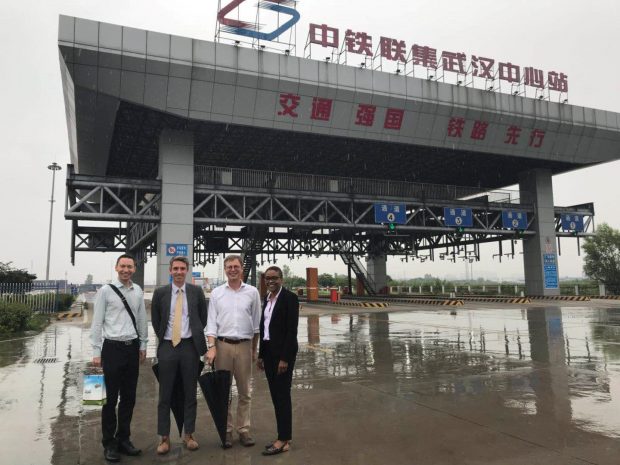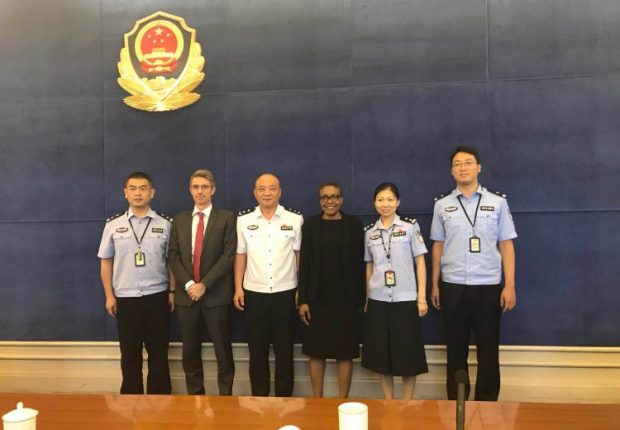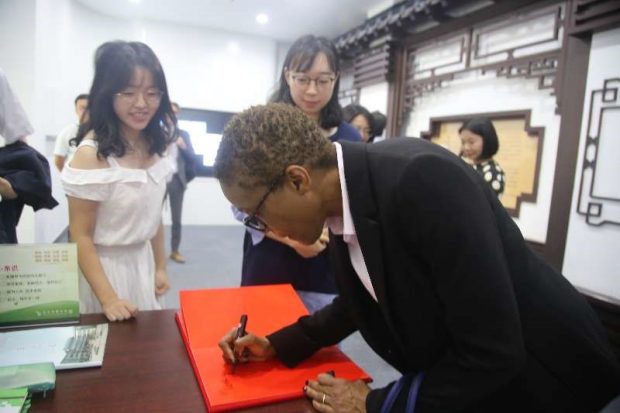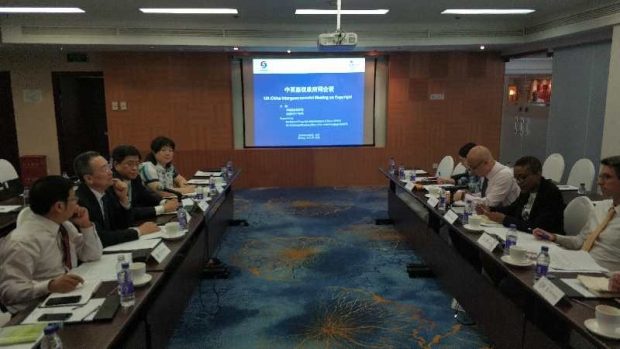I recently returned from my annual copyright and intellectual property (IP) enforcement trip to China.
On this occasion, I was fortunate to visit Wuhan, a city famous for its hot summers and even hotter food. Positioned in the centre of China, Wuhan is a beautiful city of rivers, lakes and sprawling university campuses.
Wuhan
Wuhan sits on the banks of the mighty Yangtze River and for centuries has been an important trading hub. The Yangtze retains a role in international trade today, with containers heading downstream towards ports such as Shanghai, on China’s east coast.

But trade in modern Wuhan is about far more than river traffic. The airport was full of advertisements for a new direct flight connection with the UK. The service launched last month by carrying a business delegation from the Northern Powerhouse on the first flight to Wuhan.
Wuhan is also proud of its freight train service, connecting central China to European cities including London. I visited the train freight terminal with Nick Whittingham, the British Consul General in Wuhan.

Nick is looking forward to breaking down trade barriers, cutting ribbons, and showcasing UK exports delivered via the train service. I was keen to learn about the customs and other IP enforcement checks, which will ensure markets in both our countries fully benefit from these expanding trade routes.
Beijing
Cross-border IP enforcement was also a key theme of my central government meetings in Beijing. I was delighted when a senior official in the Chinese Ministry of Public Security told me:
there are no barriers to enhanced UK-China cooperation on IP enforcement.
I agree. There is so much more we can do to reduce the negative impacts of IP crime, but we can only succeed if we do it together. I believe we made significant progress towards that aim during this trip and will be working on the details with relevant parties in the coming weeks.

Our approach is straightforward - we work constructively with China to tackle the threat from cross-border, criminal networks that operate in both our countries. We in the UK have a responsibility to take action against criminals operating within our borders, and we will support China with enforcement there. By pooling information, we can better identify, disrupt and dismantle criminal enterprises.
With the National Copyright Administration of China (NCAC), I agreed to deepen bilateral exchanges on protection for live sports broadcasts and copyright protection in mobile applications. I was also delighted to meet with a publishers delegation in Beijing and agree follow up work with my Chinese counterparts to address some of the enforcement challenges faced by academic and trade publishers.
Breakthroughs such as this are possible due to a sustained investment in our bilateral relationships. This was my seventh visit to China in four years and the trust and familiarity we have established is leading to progress.

Hong Kong
I finished my trip with a day in Hong Kong, meeting with officials and creative industry representatives. Hong Kong is a centre for trade and investment in the Asia-Pacific, and I am pleased that the UK is supporting many of the IP initiatives in the region.
Hong Kong was where I first learnt of the negative impact Illicit Streaming Devices (ISDs) can have on the creative industries, so it was good to receive an update on the enforcement action being taken against those selling the devices.

On the way back to the airport I passed Hong Kong’s huge and busy container port, a reminder of the global trading opportunities on offer to British companies.
As you look towards global markets, I would encourage all UK businesses to reach out to our excellent IP attaché network in China, Southeast Asia, India and South America. The attachés are an excellent resource for UK companies, whether you are looking for ‘know-before-you-go’ advice or have more detailed questions about local IP policy.
To keep in touch, sign up to email updates from this blog, or follow us on Twitter.
5 comments
Comment by Cheng Feng Intellectual Property Co., Ltd. posted on
China welcome you!
Comment by Sonia Edwards posted on
Simply give intellectual property rights holders the authority to demand prior art from any suspected infringer make the suspect provide prior art within two weeks of IP holder issuing the suspect their documents.
If the infringers fail to produce prior art then they should be instantly fined by the authorities providing enough money to the IP holder to fund legal fees to make the susspect provide prior art. That simple.
Comment by Jeffrey Williams posted on
When reading this comment what hope is there for people like me who have received emails telling me that not only are they going to register my trade mark but my domain names and trade using them. It seems that you cannot tell lip service from reality. After the amount of trips you have made you still have not gained anything.
Comment by Kirsty Edwards posted on
Thank you for your comments.
The UK IPO’s International Policy Directorate works closely with British businesses and are aware of the problems that they can face when exporting to China.
Visits such as this reinforce our relationship with China on Intellectual Property (IP) and have led to a number of successful outcomes in enforcement, legislative and registration procedures for UK businesses. Our additional engagement with major e-commerce platforms (including Alibaba, eBay and Amazon) has led to systemic improvements to IP protection for UK companies trading within the Chinese market.
To further support UK businesses we provide one-to-one IP support – either directly or through partners - as well as providing specific advice on how to mitigate IP risk in China. We also produce guidance, which can be found here (https://www.gov.uk/government/publications/intellectual-property-rights-in-china).
The guidance states that companies receiving speculative emails should take the information seriously but contact their usual attorney to obtain the necessary trade mark protection in China. Engaging the company that sends the speculative emails risks further incentivising bad-faith behaviour.
Comment by Barry Davies posted on
So we are holding up our end? A few realities of trying to enforce our own I.P.
1.Trading standards.. no longer exists and the few left are totally frustrated at the lack of support . Dont believe me then try contacting any trading standard office to report a infringement.
2. Customs... a joke. Again totally under resourced, even if they had details of shipment's coming in, with the amount of counterfeits coming in from China it is worse than the needle in the haystack. ( and Brexit will make it 10 times worse)
3. done the right thing..designed an original product, make it here in the UK, registered the designs and want to stop copies on EBay, Amazon or Ali express. Not a chance, they will remove them if you are lucky for a week before being relisted by the same companies. Enjoy your next trip to China, and remember you are only in your job, because people like me, design and make things. We loose our jobs, and you loose yours.